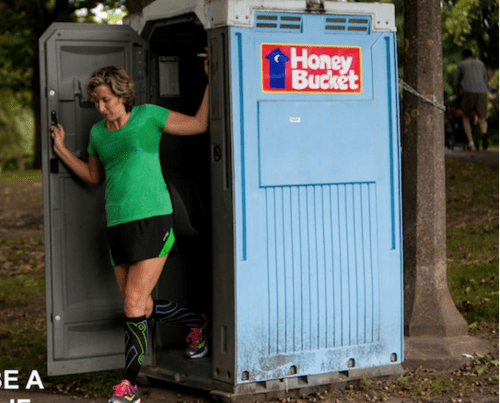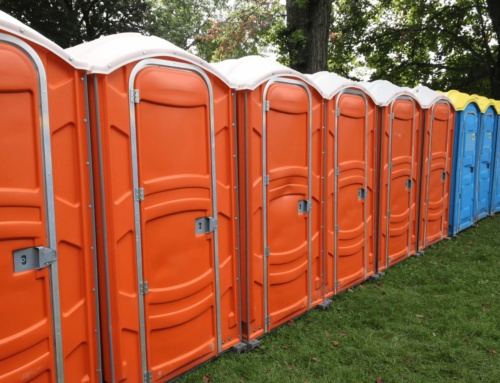
No one wants to spend more time in one of these than she absolutely, positively needs to.
A few years ago, we ran this article on how to deal with GI issues while running. But given that runs are longer as we approach spring racing season, we feel the time is right to revisit this TMI Tuesday-style topic!
Let us be blunt: Dealing with stomach issues while running can be the shits. Literally. Yet it’s a fact of life that, for many runners, tummy troubles can cause a bevy of issues, from pain to diarrhea. Here at TLAM Club, we don’t shy away from crossing the proverbial port-a-potty threshold in search of some solutions.
For a poop-primer, let’s start with why running can wreak havoc with your GI system. The up-and-down motion of running jostles your innards, turning the last night’s dinner into a sloshy mesh. On longer or more intense runs, your body struggles to provide your muscles with the blood they need to push you through your hill workout or past mile 14. Thus, different organ systems like your GI tract can end up with a serious deficit of oxygenated blood at any point during your workout. Short-changed on blood, your gut can revolt, which can then be, well, revolting.
This doesn’t mean we have to succumb to suffering through split times interrupted by a pit-stop behind a bush or hours spent in the bathroom post-run. What follows is some advice from us and sage suggestions from other mother runners:
–Hydration is one of the most commonly offered-up solutions. While dehydration can certainly be adding to the problem, especially on longer, hotter, more humid runs, simply drinking more water will not always be an easy fix to the problem. Sara reminds us that, especially when talking GI issues, it’s important not to overlook electrolytes (think Nuun or Salted Caramel GU). Carolyn, a devoted electrolyte-drinker, finds taking several small sips is better than stopping for longer “chug-a-lug” breaks.
Margaret, who is a Marathon Maniac, thinks it is absolutely essential to avoid alcohol the night before a long run or race. For her, alcohol the night before is a guaranteed cause of gastic distress.
-Coffee is also used by many to clear the [poop] chute before a morning run. Pamela, for example, found herself without her usual arsenal of coffee at the Chicago Half-marathon and says she has learned her lesson ten times over. Becky, like Pamela, finds the best results waking up half an hour to an hour early before her run to treat her body to, “a warm cup of GI start-up liquid.”

Why, yes, that *is* SBS coming out of a Honey Bucket (and, yes, they are really called that here in PacNW!), but photo was staged. For realz.
–Diet is another culprit people commonly blame as the cause of pesky stomach disturbances. While there is no one food that helps everyone, lots of mother runners have commented on Facebook about experimenting with what, how much, and when they eat in relations to their workouts. Cheryl, for example, has found eating a piece of toast or bread before her runs helps.
Amanda and Erica, conversely, found removing gluten from their diet practically eliminated GI distress “overnight.” Heather got the same result from decreasing the amount of dairy she eats. Daniela has found, regardless of each individual’s dietary needs, the best way to experiment, and hopefully finding real results, is to keep a food diary.
-Imodium is a solution many runners with GI issues end up turning to. While some of the tribe has had mixed results with it, many women have found that either taking Imodium before a run, after, or both before and after saves them the stress of mid-run pit stops. Other mother runners have experimented with TUMS and probiotic treatments. Once again, it doesn’t work for every runner but worth a shot. Megan swears by a liquid supplement called Prev. She said, “I used to struggle to run a mile without stopping to use the bathroom. Now I can train for and run a half (almost) carefree.”
-Lastly, staying relaxed before and during runs can also cut down on GI problems. Although for many of us this is a double-edged sword, since running is our de-stresser and it doesn’t help when it gets interrupted by intense GI pain, creating a routine before runs and races that keeps your mind and body calmer could potentially help. Heidi, for example, is very self-aware of her stress level going into a run and switches up her workouts to accommodate what’s been happening in her life.
Remind yourself: Each run doesn’t have to be a crap shoot (ba-boom-CHA!).
How do you, mother runner, keep your poop-chute in check when you run?






I’m another one who can’t have dairy in any whey (hah!) shape, or form. Or casein either. Apparently one shouldn’t consume something they’re allergic too. If any running fuel has that d@mn “may contain milk” statement on it (oh how I hate “may contain…”) I avoid it like the plague. Oh, and Gu = my stomach goes on a sheer and utter French Revolution-style spate of anarchy. My go-to’s instead? Mamma Chia pouches, jelly beans, and the occasional shot-blok. I’ve also tried roasted sweet potatoes and beets. Note: beets make a big mess and turn your poo purple.
A couple of the best tips I give my athletes for avoiding such issues during a run are:
1) Avoid eating too much the evening prior. A large dinner may not leave your body before the next morning’s run. I even have an athlete go as far as to avoid fiber the day pre-marathon. He still gets plenty of calories in, just little fiber.
2) Wake up nice and early so you can still have that coffee, but that also gives your body pleeennntttyyy of time for 1-3 bathroom breaks.
Clearing the chute before each run and race is key. Wake up extra early and have that warm coffee or tea with a breakfast of green smoothie always does it for me. Also sitting down instead of standing is key. Time to do your morning Sudoku puzzle instead of unloading the dishwasher.